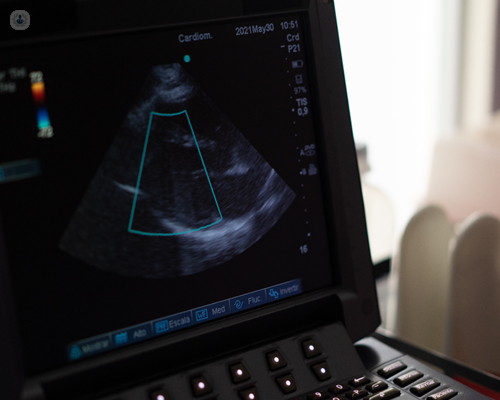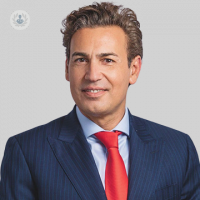Transoesophageal echocardiogram: Keeping your heart on its TOE(s)
Written in association with:A test called a transoesophageal echocardiogram (TOE) uses a probe that’s inserted into your oesophagus in order to take images of the heart’s valves and chambers using ultrasonography. It detects diseases of the heart muscle and valves.
Well-known and highly-regarded London cardiologist Dr Francesco Lo Monoco speaks to Top Doctors about the TOE procedure in expert detail. He discusses how effective this safe procedure is, what’s involved and what the result of a diagnosis can lead to, in this informative article.

How is TOE defined?
A transoesophageal echocardiogram (TOE) is similar to a regular echocardiogram test, and is a safe and effective procedure. It’s used by doctors to take a look at the heart’s chambers and valves, and is performed using an ultrasound transducer, or probe.
The transducer is placed into the back of the throat, and onto the oesophagus directly beside your heart. The ultrasound aspect of this probe refers to an imaging technique which produces images of interior body structures by using high-frequency sound waves.
After the probe is in the oesophagus, it’s carefully lowered down to the level of your upper right heart chamber (atrium). This is the position that it will be in when the ultrasound images are obtained. You won’t be able to feel or hear the sound waves during the test, and to help your doctor assess your heart function you may be given a saline or contrast dye via IV injection.
While the TOE procedure lasts around 10 to 15 minutes, patients spend around an hour in the clinic. This is because of intake, preparation and monitoring after the test. The TOE test is very safe, but can be somewhat invasive; it will often include a sedative, and/or a numbing solution for your throat and mouth. Furthermore, your doctor may ask you to fast, avoiding food and water for as long as up to several hours before the procedure.
A transoesophageal echocardiogram test is generally painless and has very few side effects. These may include:
- Nausea;
- Minor discomfort;
- Dry throat;
- Bleeding directly after the procedure.
What does a TOE test show?
A TOE test is done by inserting a probe into the oesophagus against the chest wall. It’s considered a more specialised procedure than a normal echocardiogram, due to the probe being placed much closer to the heart than a standard probe. This provides a crisper and more thorough picture of the heart’s anatomy. This means that the ultrasound waves can pass through the surrounding skin, fat and muscle tissue without touching the ribs or lungs. It’s a better location for taking realistic photographs of the heart’s chambers and valves as the blood flows in and out, as a result.
When and why is a TOE test conducted?
Your doctor might book you a TOE test for many reasons. Typically, they are used to diagnose a problem or malformation within one of your heart valves, cardiomyopathy, congenital heart disease, or aortic dissection. Plus, they determine whether valves can be repaired or replaced.
Various medically-safe locations can be used for administration of a TOE test. These include:
- An operating room;
- An intensive care unit;
- A hospital bed, if it’s a private transoesophageal echocardiogram test. Doctors can obtain critical diagnostic information without having to move patients due to the relative mobility of the testing equipment.
If you require a transoesophageal echocardiogram test, or are looking for expert treatment and diagnosis for other cardiology conditions, arrange a consultation with Dr Lo Monoco via his Top Doctors profile.


